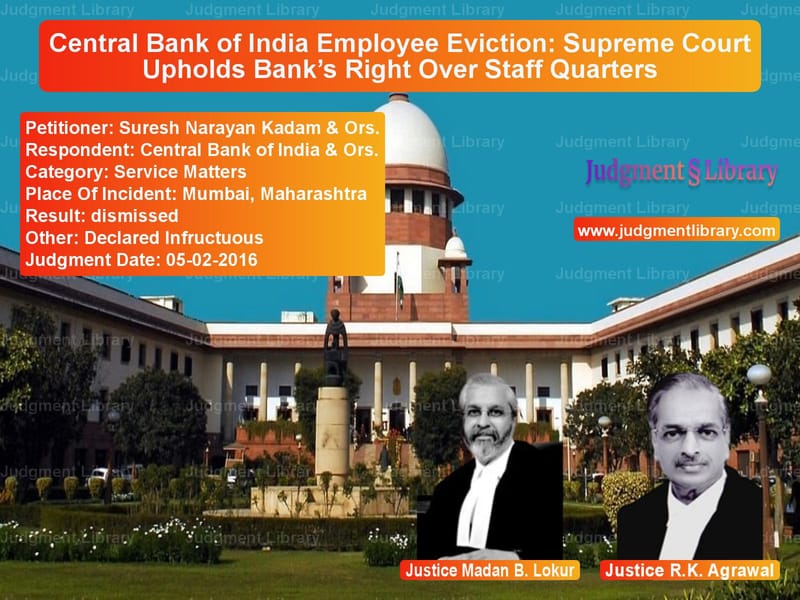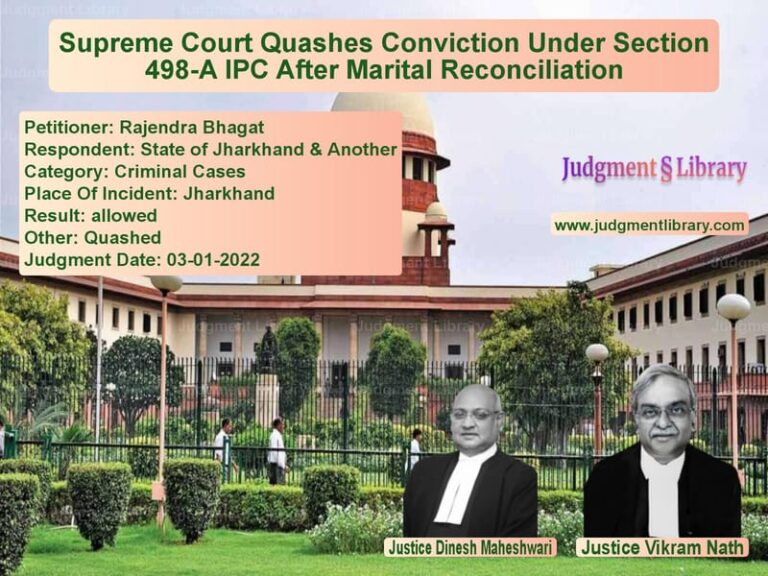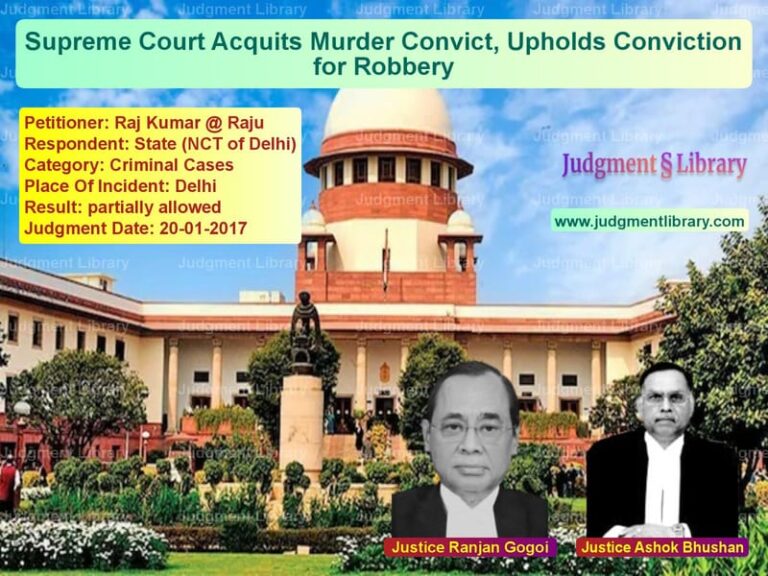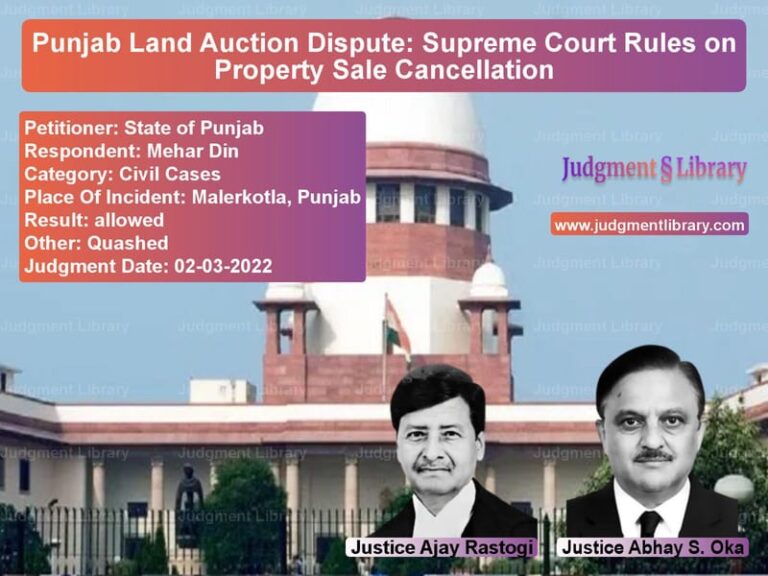Central Bank of India Employee Eviction: Supreme Court Upholds Bank’s Right Over Staff Quarters
The case of Suresh Narayan Kadam & Ors. vs. Central Bank of India & Ors. concerns the eviction of employees from staff quarters allotted by the bank. The Supreme Court upheld the bank’s right to redevelop the property and dismissed the employees’ claims of continued occupation.
Background of the Case
The dispute originated in Mumbai, where the Central Bank of India had acquired staff quarters in a residential complex known as Samata Nagar, Kandivli. The land was leased to the bank by the Maharashtra Housing and Area Development Authority (MHADA) for constructing residential quarters for its employees.
The bank issued allotment circulars in 1982 and 1983, explicitly stating that:
- The flats were for staff accommodation but not a permanent entitlement.
- The bank retained absolute discretion in allotment decisions.
- Occupancy was not a service condition.
By 1997, the bank decided to redevelop the property and stopped allotting vacant flats. In 2007, it issued eviction notices to employees occupying the premises, citing plans to demolish the buildings and construct new apartments.
Legal Battle Over Eviction
The employees refused to vacate and challenged the eviction notices before the Estate Officer under the Public Premises (Eviction of Unauthorised Occupants) Act, 1971. In 2008, the Estate Officer ruled against the employees, directing them to vacate within 15 days or face forcible eviction.
The employees then filed appeals under Section 9 of the Public Premises Act, but the City Civil Court of Bombay dismissed their petitions in June 2008.
Following this, the employees filed writ petitions in the Bombay High Court, which were dismissed on December 19, 2008. The High Court found that:
- The employees had no permanent right to the premises.
- The lease between MHADA and the bank did not grant employees a legal claim to the flats.
- The eviction notices were legally valid.
Employees’ Arguments Before the Supreme Court
The employees approached the Supreme Court, arguing:
- The staff quarters were an implied condition of service.
- The bank’s plan to demolish the buildings and construct luxury apartments for managerial staff violated the lease agreement with MHADA.
- MHADA leased the land for housing middle and lower-income staff, and repurposing it for executives violated public policy.
- The eviction notices failed to specify the reason for eviction.
Bank’s Arguments Before the Supreme Court
- The lease agreement was between MHADA and the bank, not the employees.
- The flats were provided at the bank’s discretion and were never an employment right.
- Employees had no legal entitlement to the premises.
- The redevelopment project was essential for modernizing staff housing.
Supreme Court’s Judgment
On February 5, 2016, the Supreme Court bench comprising Justice Madan B. Lokur and Justice R.K. Agrawal upheld the bank’s right to evict the employees. The key rulings were:
- The employees had no vested right to the staff quarters.
- Occupancy of bank-owned premises does not confer tenancy rights.
- Alleged violations of the lease agreement were a matter between MHADA and the bank, not the employees.
- There was no public interest justification to block the redevelopment.
- The bank was free to proceed with redevelopment plans while ensuring alternative arrangements for affected employees.
The Court noted:
“There is no doubt that none of the employees have any right to retain the allotted premises, more particularly since the allotment was not a part of their condition of service.”
The Court allowed the employees to stay in the premises until March 31, 2016, after which the bank could enforce eviction.
Key Legal Takeaways
- Employer-Owned Housing is Not a Permanent Right: Employees cannot claim tenancy over staff quarters.
- Lease Disputes Do Not Grant Employee Rights: Only the contracting parties (MHADA and the bank) can challenge lease terms.
- Eviction Notices Must Be Honored: If issued legally, employees must comply with eviction orders.
- Modernization and Redevelopment Are Legal: Employers can repurpose property as long as they comply with lease terms.
Conclusion
The Supreme Court’s judgment clarifies that employees residing in staff quarters cannot claim ownership or permanent occupancy. The ruling reinforces employer rights in managing their properties while ensuring legal eviction procedures are followed.
Don’t miss out on the full details! Download the complete judgment in PDF format below and gain valuable insights instantly!
Download Judgment: Suresh Narayan Kadam vs Central Bank of Indi Supreme Court of India Judgment Dated 05-02-2016-1741852478733.pdf
Direct Downlaod Judgment: Direct downlaod this Judgment
See all petitions in Employment Disputes
See all petitions in Public Sector Employees
See all petitions in Termination Cases
See all petitions in Judgment by Madan B. Lokur
See all petitions in Judgment by R K Agrawal
See all petitions in dismissed
See all petitions in Declared Infructuous
See all petitions in supreme court of India judgments February 2016
See all petitions in 2016 judgments
See all posts in Service Matters Category
See all allowed petitions in Service Matters Category
See all Dismissed petitions in Service Matters Category
See all partially allowed petitions in Service Matters Category







